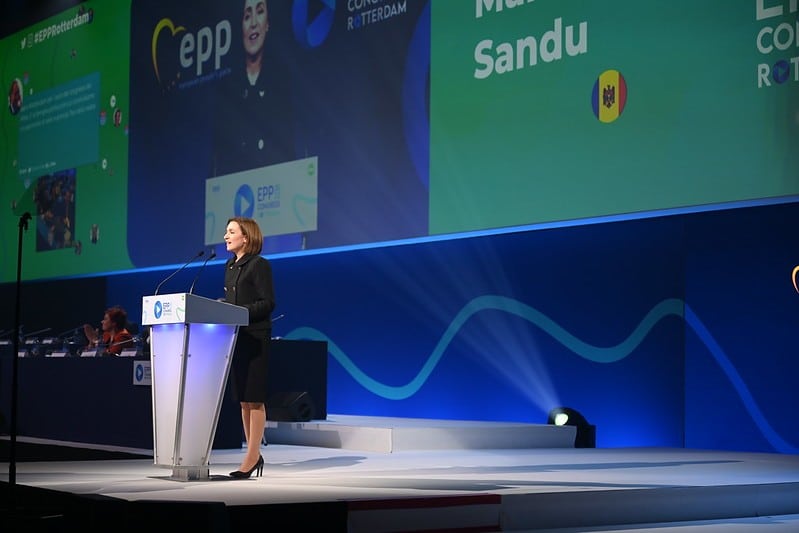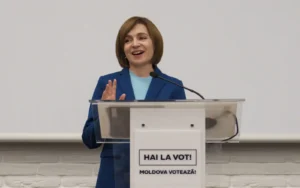President Sandu speaking on the European People’s Party Congress in Rotterdam, 2022 (Flickr)
As Moldova slips into an economic crisis, anti-government protests were organised in the streets of Chișinău, led by pro-Russian socialists and the opposition party of fugitive Ilan Schor. It further increases the pressure on President Maia Sandu’s pro-European government, which finds itself in a difficult quandary.
Moldova in economic turmoil
Moldova’s record-high inflation of 34.3% brought its pre-expected growth to zero for 2022. The country, already considered one of the poorest in Europe, deals with an economic crisis as a result of the war in Ukraine. The 3.5 million people in the country are dealing with serious economic difficulties related to energy prices that are rapidly increasing. In august alone, the energy prices increased 47%. These costs further increased this month by another 29%. Moldova, landlocked between Ukraine and Romania, is dependent on Russian energy giant Gazprom, which is majority state-owned by the Kremlin, for its energy supply. According to Deputy Prime Minister Andrei Spînu, Moldova’s national gas distribution company – Moldovagaz – requested Gazprom a postponement of payment for the energy bill of August, which was eventually accepted by the Russian energy giant.
Russian threat and dependency
Reliance on Russian energy supplies to Moldova is not the only way the two countries are tied together. The countries have traditionally strong economic relations with each other. But above all, the (unwanted) presence of Russian troops in the Russian-backed renegade region of Transnistria, ensures that Russia remains an everyday present factor for Moldova. With the Russian invasion of Ukraine still continuing, the country has repeatedly expressed its concern over the last months that the invasion will expand into Moldovan territory. In her Independence Day speech on August 27, President Sandu condemned the Russia’s invasion once again. Simultaneously, she pushed again for EU membership by saying: “This year, Moldova became a candidate country for accession to the European Union. Moldova can become truly strong, able to defend its citizens only in the family of European countries.”
Russia’s invasion of Ukraine put Moldova in a difficult position. For Sandu’s government, on the one hand, it was an opportunity to seize the momentum to make Moldova’s European candidacy a reality, with a huge step towards that direction when Moldova was granted the EU candidate status on 23 June 2022. On the other hand, a muddling of relations with Russia has major economic implications for the country. For Sandu herself, the trade-off is by definition not a complicated equation. During the Independence Day speech, she told the crowd that: “If some ask what freedom and democracy are used for when prices rise, we will answer them: Our freedom makes us stronger, gives us voice, dignity, and power, makes us stand upright, not fearful, and judge by our own interest, not by the dictate of someone outside.”
Anti-government protests call for resignation
However, her pro-European mode of leadership now bears economic consequences. The pro-Russian opposition who have little with the sentiment of a pressured democracy, are not neglecting the opportunity to express their dissatisfaction with the economic crisis in Moldova. During the anti-government protests, falling living standards, rising prices and the increased price of Russian gas were arguments to demand the resignation of Sandu and her administration. The protesters blame Sandu, among other things, for failing to negotiate a better deal for Russian gas. Tent camps were set up outside of the government headquarters, with many vowing to remain there until Sandu’s resignation or a call for early elections.
The assembly of a tent camp was instigated by Ilan Shor, an oligarch who fled to Israel following his conviction for fraud and money laundering. Simultaneously, the pro-Russian Socialist Party led by former president and opposition leader Igor Dodon called upon Sandu’s government last August to go to Moscow and negotiate cheaper gas from Russia following an announcement that gas prices increased with 47% that month. Dodon, who lost the elections in 2020 and is currently investigated for four criminal cases which could put him behind bars for up to 20 years, also called for early elections.
European solution to Sandu’s dilemma
With the approaching cold season and gas deliveries for October from Russia not being an ensured deal, Russia exerts economic and political pressure on the Moldovan government. The problem with energy shortages and high costs is a problem throughout Europe. Thus, several countries in the region are pulling together to achieve gas supplies during the cold months. Albania and northern Macedonia, for instance, struck a deal with Serbia, which recently signed a new 3-year contract with Gazprom for the supply of Russian gas. In addition, the countries called on the European Union to include the region in support plans. Undoubtedly, Sandu hopes that Moldova will also be included in a European solution on this issue instead of negotiating a new deal with Gazprom, thereby easing pressure on the Moldovan economy and her political leadership.
Author: Mathieu Neelen
Sources: APNews, BalkanInsight1, BalkanInsight2, CouncilOfEurope, RadioFreeEurope, Reuters1, Reuters2, Reuters3, Reuters4, WashingtonPost
Photo: Flickr



